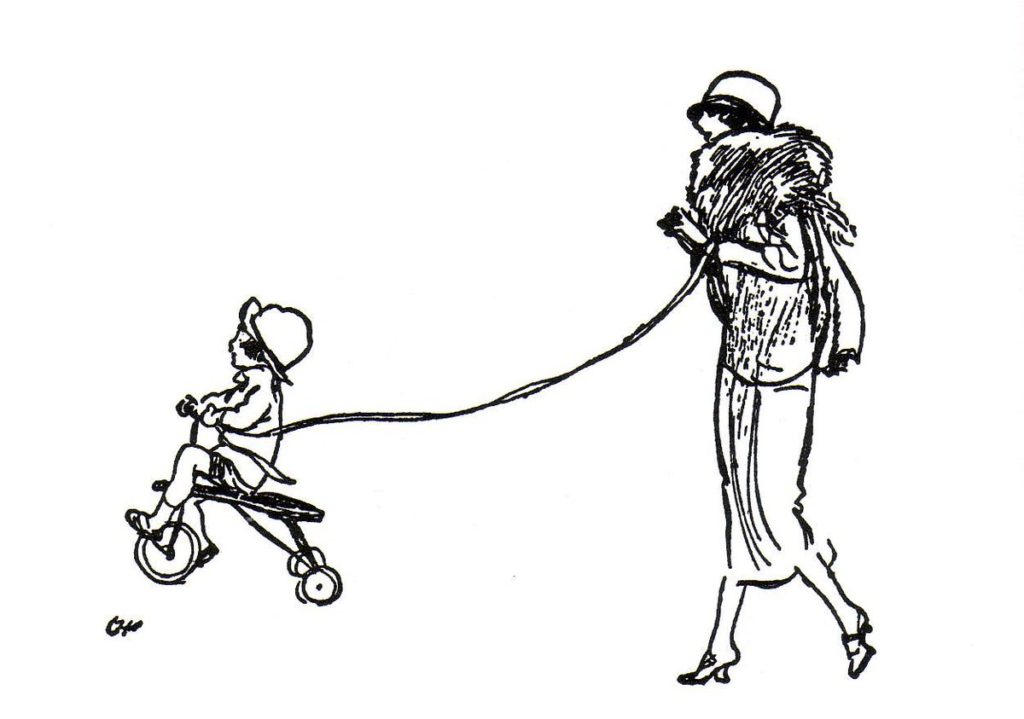Wednesday
My 95-year-old mother has difficulty going up and down stairs—two years ago she broke a vertebra and a rib while doing so—so Julia and I now insist on accompanying her up and down the seven-step staircase that joins her split-level ground floor. But because, for admirable reasons, she fiercely guards her independence, sometimes she tackles the stairs without alerting us. At those moments, I find myself internally reciting A. A. Milne’s “Disobedience.”
The “disobedient” party in this case is the mother of James James Morrison Morrison Weatherby George Dupree. I’m the judgmental three-year-old.
Disobedience
James James
Morrison Morrison
Weatherby George Dupree
Took great
Care of his Mother,
Though he was only three.
James James
Said to his Mother,
“Mother,” he said, said he;
“You must never go down
to the end of the town,
if you don’t go down with me.”
James James
Morrison’s Mother
Put on a golden gown.
James James Morrison’s Mother
Drove to the end of the town.
James James Morrison’s Mother
Said to herself, said she:
“I can get right down
to the end of the town
and be back in time for tea.”
King John Put up a notice,
“LOST or STOLEN or STRAYED!
JAMES JAMES MORRISON’S MOTHER
SEEMS TO HAVE BEEN MISLAID.
LAST SEEN WANDERING VAGUELY:
QUITE OF HER OWN ACCORD,
SHE TRIED TO GET DOWN
TO THE END OF THE TOWN –
FORTY SHILLINGS REWARD!”
James James
Morrison Morrison
(Commonly known as Jim)
Told his
Other relations
Not to go blaming him.
James James
Said to his Mother,
“Mother,” he said, said he:
“You must never go down
to the end of the town
without consulting me.”
James James
Morrison’s mother
Hasn’t been heard of since.
King John said he was sorry,
So did the Queen and Prince.
King John
(Somebody told me)
Said to a man he knew:
If people go down
to the end of the town,
well, what can anyone do?”
(Now then, very softly)
J.J.
M.M.
W.G.Du P.
Took great
C/0 his M*****
Though he was only 3.
J.J. said to his M*****
“M*****,” he said, said he:
“You-must-never-go-down-to-the-end-of-the-town
if-you-don’t-go-down-with-ME!”
The poem appeared in When We Were Very Young, published in 1924. In other words, it was written at a time when British women were agitating for the right to vote—the Equal Franchise Act would pass four years later—and during the jazz age, when women enjoyed increased independence and sexual freedom. I mention these historical facts because they help us understand some of the currents flowing through this otherwise whimsical poem.
Basically, James’s mother is abandoning her sacred childcare duties to fulfill her own desires. The golden gown is a sign that she is at least going dancing, with a hint of more, and the fact that she takes a car speaks to the newfound sense of freedom that many women experienced with the automobile. My former colleague Michael Berger, who studies the history of cars, once wrote an article about how women driver jokes stemmed from male anxieties about this freedom.
And then there’s “town,” which stands in contrast with bucolic rural England and traditional values. (Some rural Americans see our cities in the same light.) Once women start going to town, the slippery slope to moral anarchy has begun. “If people go down to the end of the town–well, what can anyone do?” King John asks helplessly. No wonder he’s offering a forty-shilling reward!
What the reigning power structure regards as “wandering vaguely, quite of her own accord” may not be vague at all. Maybe James’s mother is Kate Chopin’s Edna Pontellier from The Awakening (only hopefully without the final suicide). In any event, she appears to have other things in mind than serving tea.
I love the imperiousness of the three-year-old James. Milne captures perfectly the bossiness of children at that age. After all, for them the whole point of mothers—and everyone else, actually—is to take care of them. The fact that this three-year-old has an over-the-top pompous name reinforces his sense of his own entitlement.
“You must never go down the stairs without consulting me?” How about if we just engage in a reasonable discussion about the matter?


